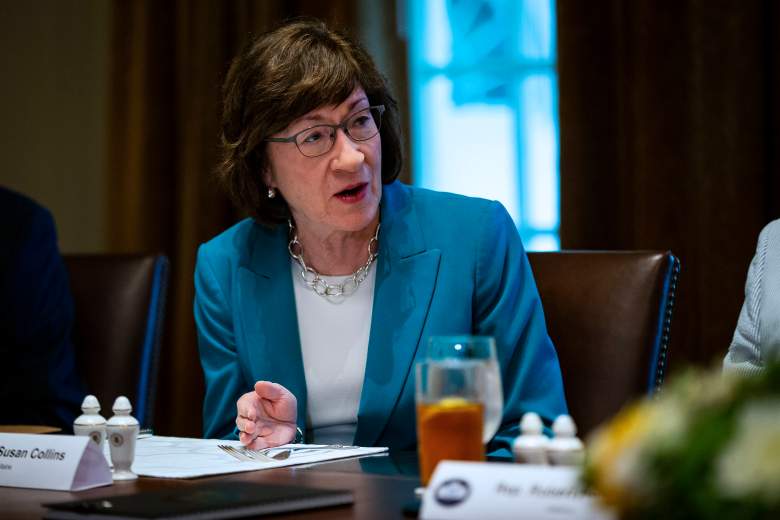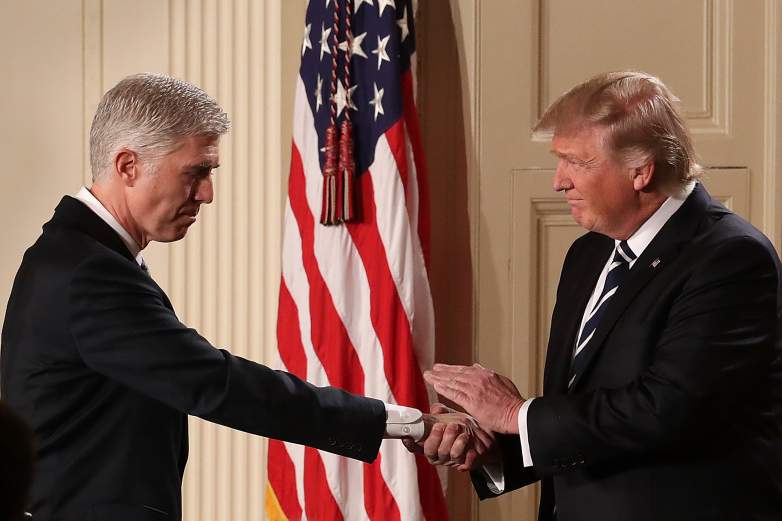
Getty Senator Susan Collins (R-ME) at a lunch meeting for Republican lawmakers in the Cabinet Room at the White House June 26, 2018
Republican Senator Susan Collins of Maine may have the deciding vote when it comes to confirming President Trump’s nominee to the Supreme Court. Democrats do not have the votes to block the nominee, after Republicans invoked the “nuclear option” last year. There are 51 GOP Senators, and that is enough to get a new justice confirmed.
But abortion rights are expected to be a contentious issue in the nomination process. Senator Collins has made it clear that she would not support a nominee who would overturn Roe v. Wade, because she wants someone who respects precedent.
Here’s what you need to know.
Collins: “Roe v. Wade Is Settled Law”
On ABC on Sunday morning, Senator Collins said: “I’m going to have an in-depth discussion with the nominee and I believe very much that Roe v. Wade is settled law, as it has been described by Chief Justice Roberts. It has been established as a constitutional right for 45 years, and was reaffirmed 26 years ago. So a nominee’s position on whether or not they respect precedent will tell me a lot about whether or not they would overturn Roe v. Wade. A candidate for this important position who would overturn Roe v. Wade would not be acceptable to me because that would indicate an activist agenda that I don’t want to see a judge have. And that would indicate to me a failure to respect precedent.”
The Roe v. Wade decision was announced on January 22, 1973. Justice Harry Blackmun delivered the majority opinion, stating that the issue came down to a woman’s right to privacy.
Justice Blackmun’s opinion stated: “This right of privacy, whether it be founded in the Fourteenth Amendment’s concept of personal liberty and restrictions upon state action, as we feel it is, or, as the District Court determined, in the Ninth Amendment’s reservation of rights to the people, is broad enough to encompass a woman’s decision whether or not to terminate her pregnancy.”
And a recent poll by the Kaiser Family Foundation found that a majority of Americans (67%) want the court to protect a woman’s constitutional right to abortion. 29% of those polled said they’d like to see Roe v. Wade overturned.
President Trump Promised to Appoint Pro-Life Justices During the Campaign
During the 2016 election, then-candidate Trump promised that he would be nominating pro-life justices to the court. In a debate moderated by Fox News anchor Chris Wallace, Trump was asked directly if he wanted to see the court overturn Roe v. Wade.
Trump’s response was: “If we put another 2 or perhaps 3 justices on, that will happen, and that will happen automatically in my opinion because I am putting pro-life justices on the court. I will say this, it will go back to the states and the states will then make a determination.”
However, Senator Collins says that the issue of abortion rights may not come up during the president’s interviews with nominees. She told CNN that President Trump will not even ask about Roe v. Wade.
“The president told me in our meeting that he would not ask that question. And that is what he has most recently said, on the advice of his attorney. I think what he said as a candidate may not have been informed by the legal advice that he now has said it would be inappropriate for him to ask a nominee how he or she would rule on a specific issue.”
Even With the Nuclear Option, Supreme Court Confirmation Is Not Guaranteed

President Donald Trump shakes hands with Judge Neil Gorsuch after nominating him to the Supreme Court during a ceremony January in Washington, DC. If confirmed, Gorsuch would fill the seat left vacant with the death of Associate Justice Antonin Scalia in February 2016. (Getty)
The nuclear option gives the Senate the ability to confirm a judicial nominee with a simple majority, instead of the typical 60 votes. Democrats took advantage of this option in 2013, in order to confirm President Obama’s nominees to lower courts. But the required 60-vote threshold remained in place for Supreme Court picks.
Fast-forward to 2016: Republicans successfully blocked the nomination of Judge Merrick Garland, President Obama’s choice to replace Antonin Scalia. The GOP’s rationale was that since there was an impending election, the next Justice should be chosen by the next president. Democrats, being the minority party in Congress, could not muster enough votes to put Garland on the bench.
After winning the election, President Trump nominated Neil Gorsuch. Republicans, led by Senator Mitch McConnell, changed the rules again making the nuclear option applicable to Supreme Court confirmations. Gorsuch earned votes from three Democrats, making the final vote 54-45.
Here’s why the nuclear option does not guarantee confirmation this time around: Republicans may not have Senator John McCain’s vote. The Arizona Republican has been absent as he battles brain cancer. If the other 50 Republicans all vote together, then Vice President Pence can cast the tie-breaker. But if even one Republican dissents, then the nominee could be blocked. That is why Senator Susan Collins can expect to be lobbied hard from both sides as the debate continues.

